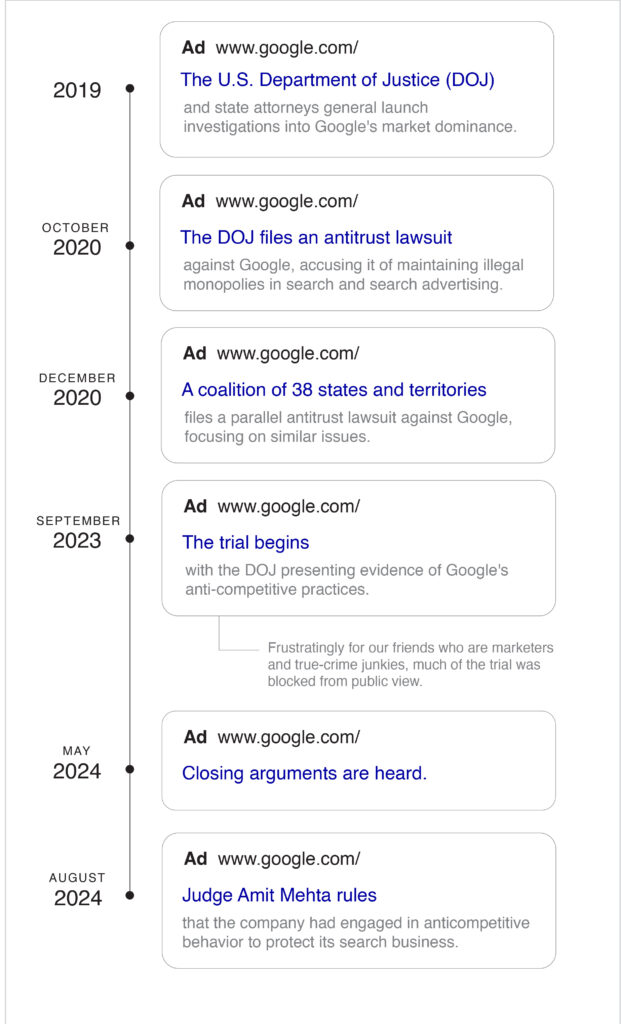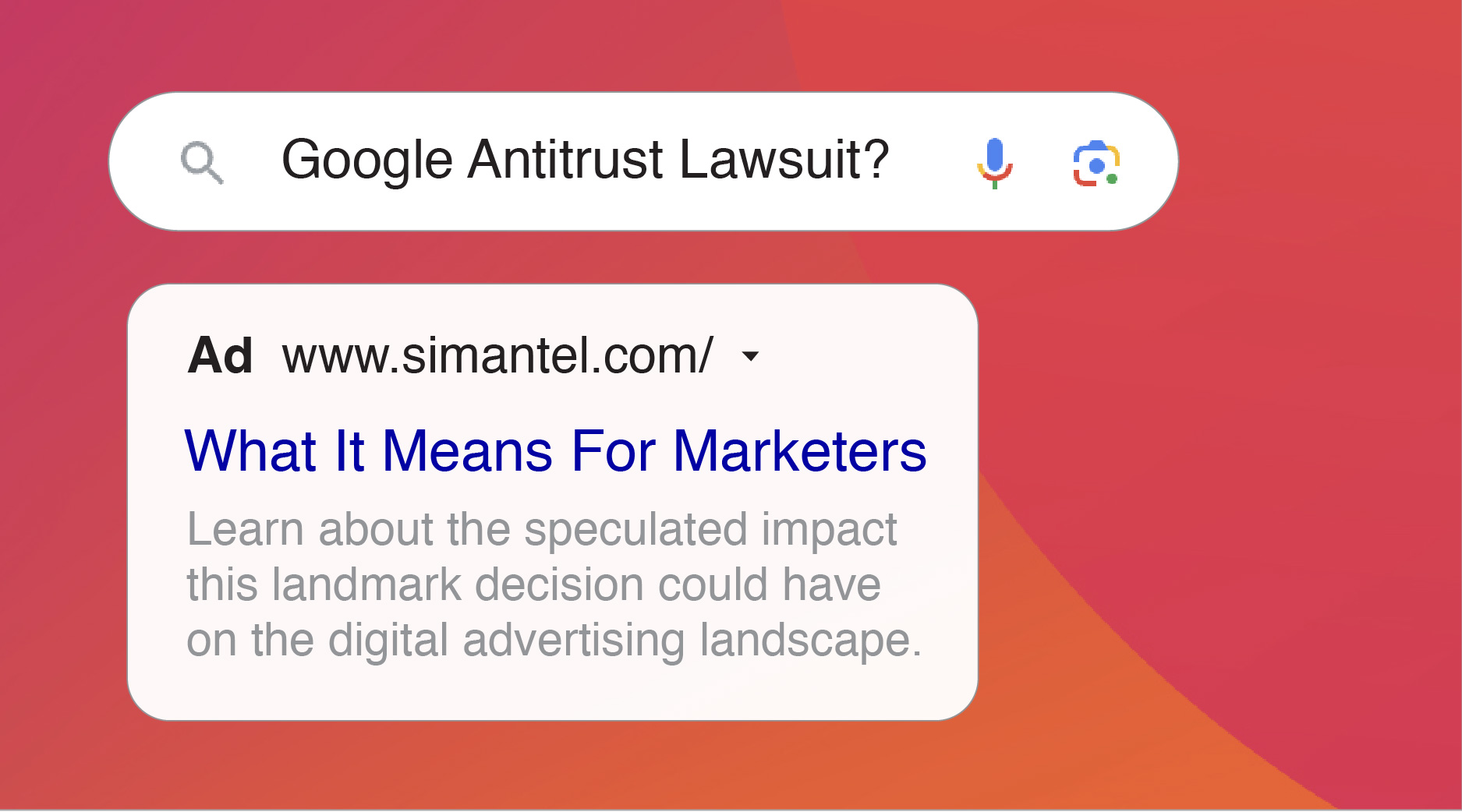Important disclaimer: We are not lawyers! Great, now that that’s out of the way, let’s talk about the Google Antitrust Lawsuit. As marketers, we have a lot of vested interest in the speculated impact this landmark decision could have on the digital advertising landscape!
In Case You Missed It: The Google Antitrust Lawsuit Condensed Timeline
2019: The U.S. Department of Justice (DOJ) and state attorneys general launch investigations into Google’s market dominance.
October 2020: The DOJ files an antitrust lawsuit against Google, accusing it of maintaining illegal monopolies in search and search advertising.
December 2020: A coalition of 38 states and territories file a parallel antitrust lawsuit against Google, focusing on similar issues.
September 2023: The trial begins with the DOJ presenting evidence of Google’s anti-competitive practices.
Frustratingly for our friends who are marketers and true-crime junkies, much of the trial was blocked from public view.
May 2024: Closing arguments are heard.
August 2024: Judge Amit Mehta rules that the company had engaged in anticompetitive behavior to protect its search business.
Now we’re here together in current time where we are all speculating about what this case means for marketers. And the good news is a lot also hasn’t happened!
Things To Come
Google has said that they will appeal and that process is expected to have significant impacts to the forward looking timeline. While the court has scheduled a remedy hearing for early September to determine appropriate consequences for Google, this is expected to be a complex and contested process.
The Most Likely and Most Immediate Impact
1. Shifts in Advertising Costs
This is where we expect to see the most impact because this lawsuit has also stirred up concerns around Google’s practices in its ad auction process. It was revealed that Google may have manipulated auctions to increase ad prices by 5-10% for certain queries. If the court’s final remedies include changes to how Google runs its ad auctions or even the introduction of alternative ad platforms, advertisers could see more competitive pricing for digital paid advertising. It’s also possible that this won’t come to fruition yet as Google is also facing another major antitrust lawsuit in the form of a class-action lawsuit from advertisers that alleges Google monopolized the ad market for small-to-midsize advertisers.
2. AdTech Innovation
For us MarTech junkies, a potential outcome of this decision that we are hoping to see is an upsurge in new competitors and technologies in the advertising space. Whether that’s newer placement offerings, opportunities from existing major players in tech or a new monolith having its moment. We’re already deep in the trenches of AI’s impact on our industry and are hoping all of that momentum paired with an enhanced competitive energy in the market is going to bring about rapid innovation and evolving capabilities in the AdTech space.
3. An Increased Appetite for Marketers to Try New Things (and Old Things)
With the culmination of a landmark decision like declaring Google a monopoly, major shifts in consumer preferred content formats and our observation of an increase in FOMO-mindsets culturally – we are expecting to see more marketers re-invest in channel testing. Because in recent years we’ve seen that the landscape can evolve seemingly overnight and marketers want to be prepared for it. We’ve had countless clients and their leaders coming to us and saying, “Give me a marketing plan that hits our goals, but let’s also add in a testing budget on top of that.” Whereas in previous years we’ve had to more actively advocate for the long-term value of “learning budgets.”
We know, our clients are the best!
This re-investment in channel testing includes paid and owned channels. A lot of brands have recently reinvested in owned and influenced efforts as they can be cost effective ways to build long-term engagement when paired with effective and optimized paid channels.
We’ve also seen an increase in brands going back to more “traditional” channels like print, physical conditioning, mailers and PR boxes. Consumer behavior and expectations are always shifting!
The Longer-Term Impact
1. More Algorithms? Maybe? An Evolution of How We Think About SEO
Search engine optimization (SEO) has been heavily influenced, the DOJ might even say monopolized, by Google’s algorithms for years. With SEO specialists predicting, testing and optimizing to every new algorithm update. Our websites are purpose built to be crawler friendly, snippet rich and highly competitive to the Google search algorithm. However, with new competitors potentially gaining market share, our SEO strategies will have to evolve to meet the ranking requirements across a more diverse search landscape which could prove challenging!
The good news: This shouldn’t happen overnight (if it happens at all)! Entering the search market requires incredible capital investment and only Microsoft has had any real head start beyond some specific regional companies.
Realistically, we expect to see tech leaders re-evaluate their investment or partnership models for search. We should however be able to monitor trends and see these changes coming before they are expected to have significant impact to our teams. It seems at this point very unlikely that core Google search will be broken up or divested in a significant way (but it could theoretically happen – we’re not lawyers or judges!)
2. Changing How We Think About Marketing Teams
If we have learned anything in the last 5 years it’s that our industry is changing rapidly, and for many marketers, it’s changing faster than they can keep up. Consumer behavior is evolving at breakneck speeds and divides in how different generations engage with brands and media is both vast and widening. The key fundamentals of marketing will remain true, that it comes down to meaningfully engaging with your customer segment to meet their needs. But how we do that continues to change format and channel while data becomes both more prevalent and more heavily monitored. Marketers are expected to wear so many hats – and while we champion the generalist – redistributing expectations to cross-functionally highly-collaborative teams of in-house and agency specialists is more crucial now than ever.
Need A Plan for Your Future?
Forecasting and Futures Thinking to Impact the Present
We’ll Be Waiting And Watching Coverage As The Google Antitrust Case Progresses
Ultimately, we’re going to learn together what the outcomes of this ruling will be. Knowing that Google plans to appeal the decision, it will likely be far past the September remedies court date that the true impact of this decision is felt by day-to-day users of Google platforms.
While we’re continuing to test channel mixes for our clients and ourselves, we don’t foresee Google disappearing overnight as a cornerstone channel for our paid or owned strategies. While we can’t predict the future with perfect accuracy, we can look into the past to see how similar stimuli helped shape the world we know today. Fortunately for us, this isn’t the first time a tech giant has gone toe-to-toe with courts over antitrust concerns. It’s been over 20 years since the Microsoft Antitrust Case of the 1990s and they are still a major player in consumer electronics—even if that landmark decision helped establish a market favorable to the emergence of tech giants like Google and Apple.
Just Want the Key Takeaways
As always, we’re here if you need us!




